Taking The SAT: What Students Need to Consider
Around 1.97 million students recently took the SAT, and you’re probably wondering if you should be one of them. Spoiler alert: if you’re dreaming of studying in the United States, this test could be your ticket.
But here’s the exciting part: SATs have just got a major upgrade. It’s now digital, and the best part? It’s shorter! The test now takes only 2 hours and 14 minutes, down from 3 hours and 15 minutes. That’s a whole 33% less time to show off what you know.
If you’ve been working with a study abroad consultant, you’ve probably already heard how important the SAT is in your application. In this guide, we’ll break down everything you need to know, from the SAT registration fee to smart tips for success. Ready to tackle the SATs and move one step closer to your dream school? Let’s dive in!
What’s the SAT All About?
The SAT (Scholastic Assessment Test) is a standardised test created by the College Board to assess a student’s readiness for college. It’s one of the most widely recognised tests for undergraduate admission, not just in the U.S., but around the world.
- It’s accepted by thousands of universities across the U.S. and by institutions in over 85 countries outside the U.S.
- In fact, the SAT has test centres in 187 countries globally.
- Many universities in countries like Canada, the UK, Australia, Singapore, Germany, India, Hong Kong, New Zealand, and more accept SAT scores as part of their admissions or scholarship calculations.
So even if you're not in the U.S., taking the SAT can open doors at universities around the globe.
SAT Breakdown:- Reading & Writing: This includes reading, comprehension questions and writing tasks. It’s meant to test your ability to analyse and interpret texts.
- Math: Covers algebra, problem-solving, data analysis, and some advanced math. (No advanced calculus, though.)
- Essay (optional): Some schools require it, but it’s optional for most. You’ll be asked to analyse a passage and write a persuasive argument based on it.
Fun fact: According to the College Board, in 2023, over 1.7 million students took the SAT! That’s a lot of future college students prepping for their next big step.
What Education Leaders Are Saying
David Coleman, CEO of College Board, emphasises: "We are thinking less about where you get in than what you need for success. It's not really about what college you go to." This shift toward skills-based assessment is exactly why the SAT evolved into its current digital format. Coleman also noted the relevance challenge, highlighting why the digital transformation was necessary.
SAT in Numbers
- Test Duration: 2 hours 14 minutes (much shorter!)
- Annual Test Takers: Nearly 2 million students
- Score Range: 400-1600 points
- Digital Format: 100% computer-based since 2024
Expert Insight: College Board's transformation reflects what educators heard from students. They believe that taking the SAT online provides a major advantage for students.
The Digital Revolution: What Changed in 2025
Gone are the bubble sheets! The SATs went completely digital, and honestly, it's way better for students now.
| Section | Questions | Time | What It Tests |
|---|---|---|---|
| Reading & Writing | 54 | 64 minutes | Critical thinking, grammar |
| Math | 44 | 70 minutes | Problem-solving, algebra |
|
Total |
98 | 2h 14m | College readiness |
Real Talk from Test Prep Experts: The online SAT format isn't just different, it's genuinely better. Leading education platforms report that students using the new format show 15% to 20% improvement in time management compared to the old paper version.

SAT Scores: What You Really Need to Know
Okay, let’s talk numbers, the ones that actually matter for your college applications.
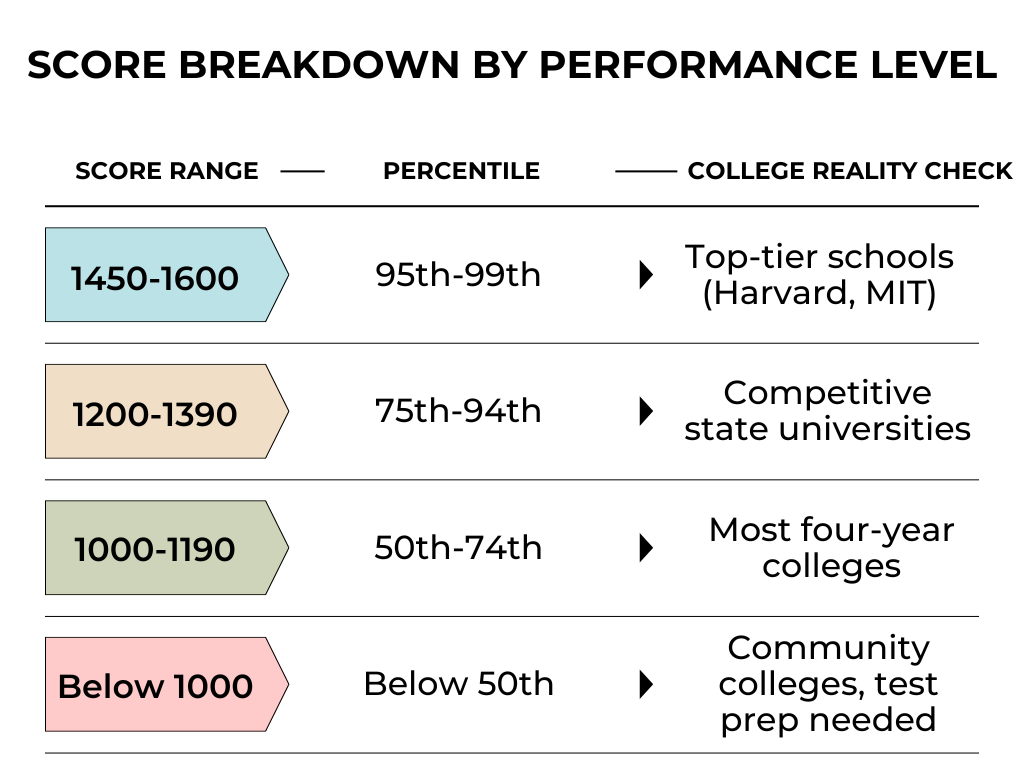
Pro Tip: If you score 1050, you're sitting pretty right in the middle of all test-takers. It’s not a bad place to be if you’re aiming for an average or slightly above-average performance!
Ready to Register? Here’s Your No-Stress Guide
Thinking about SAT enrollment? Good news: registration doesn’t have to be overwhelming. In fact, it’s a pretty straightforward process, especially if you know what to expect.
Here’s your quick, step-by-step game plan:
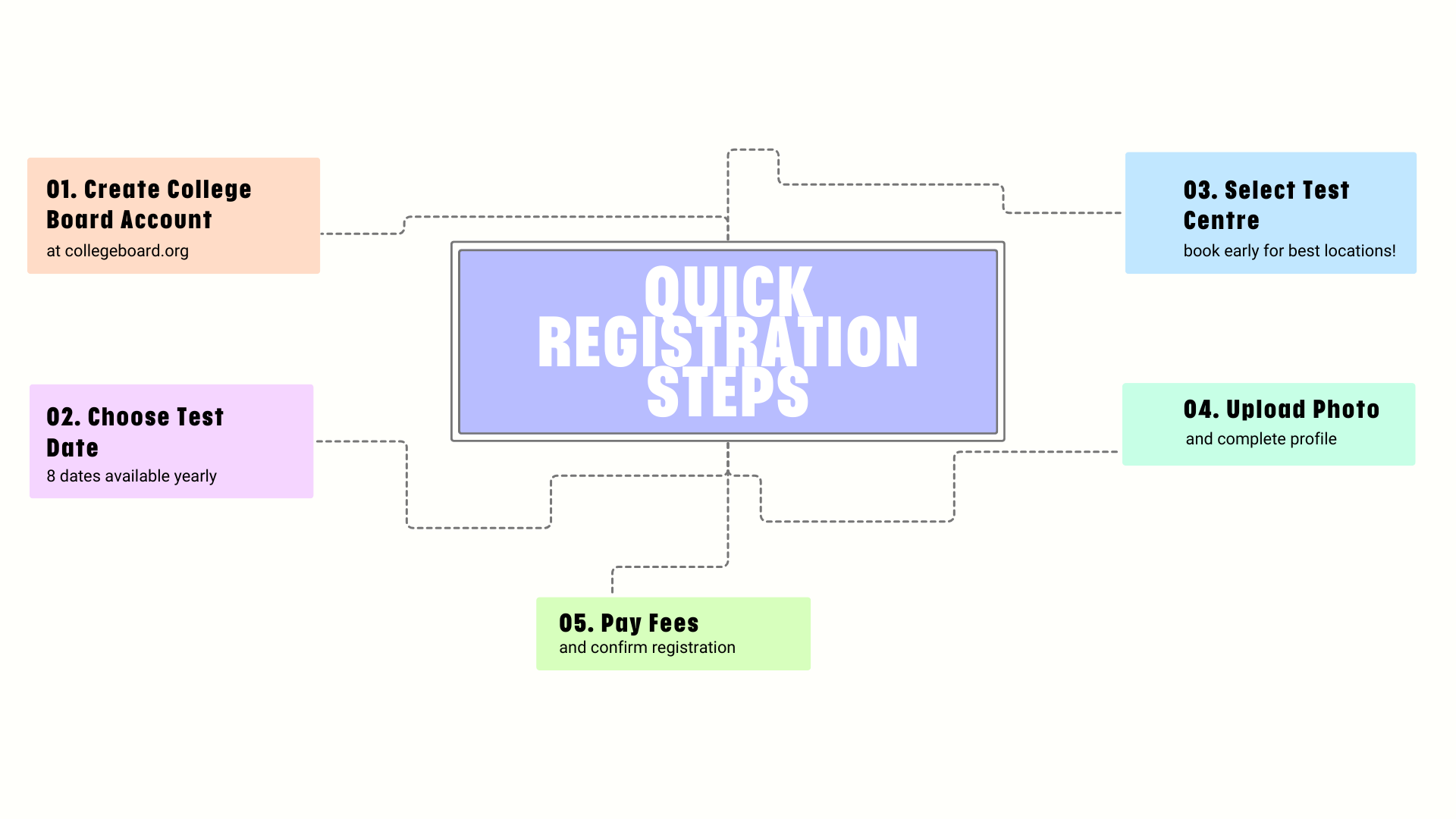
Want the full breakdown of what it costs, how fee waivers work, and how to avoid late fees? Check out our full blog on SAT registration and fees; it's packed with everything you need to know before you pay.
Pretty simple, right? Once you’re registered, the next step is figuring out when to take the SAT and how to make the timing work for you. Let’s break that down next.
Best 2025 SAT Test Dates: Why Timing Is Everything
Believe it or not, when you take the SATs can be just as important as how well you do. Picking the right test date gives you a better shot at hitting your target score, and it helps reduce stress during application season.
Here’s a smart breakdown of SAT exam dates and how to use them to your advantage:
- March / May: Perfect for juniors who want to take the SAT early.
- August / October: Great options for a second attempt or even your first, especially after summer prep.
- November / December: The last call for seniors. Don’t wait this long unless you absolutely have to.
Smart Move: Did you know that 68% of SAT takers in 2024 took the test during a School Day? That means less weekend stress, no extra travel, and often, free testing through your school. Ask your counsellor if your school offers it!
Not sure which test date is right for you? Check out our complete blog on SAT test dates. It includes the full test calendar, registration deadlines, and insider SAT tips and tricks to help you choose the perfect date.
Money Talk: What Does It Really Cost?
Let’s face it, the fee for SAT registration isn’t exactly pocket change. Here’s the breakdown
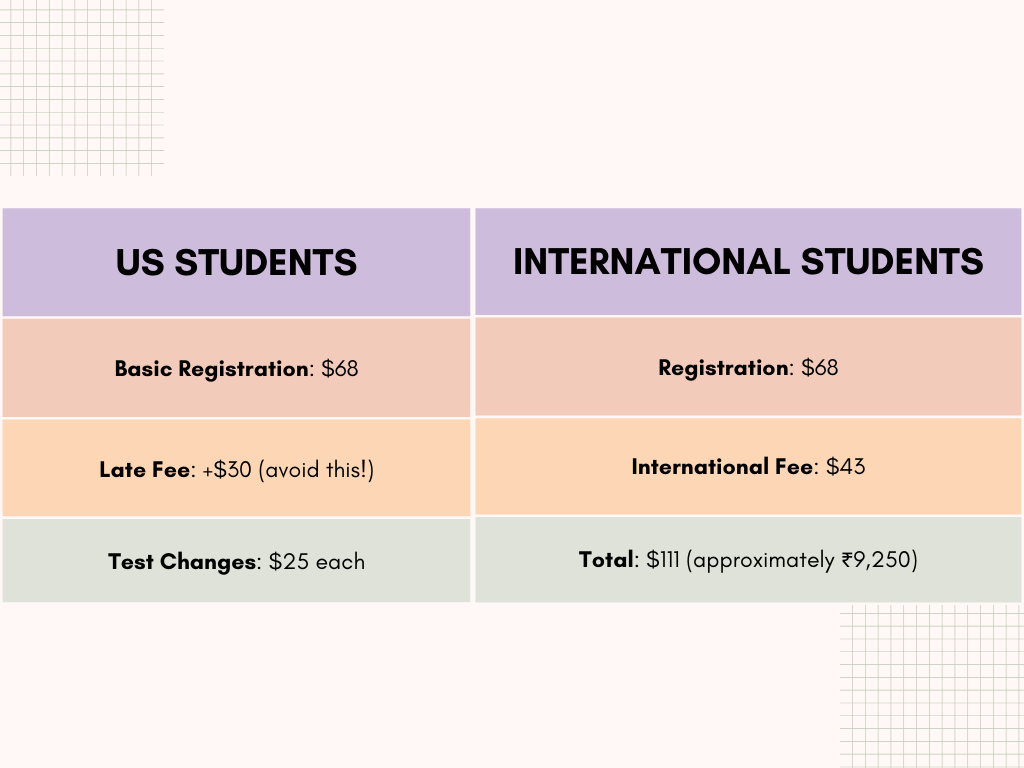
- Registration Fee: $60 (this is for the regular test).
- Essay (if required): $16 (for the optional essay section, though many colleges don’t require it).
- Additional Fees: Things like late registration and changing test dates will cost extra (usually around $30 per change).
Money-Saving Hacks: Don’t Overpay!
Who doesn’t love saving a little cash? Here are some tips to keep your cost of SAT registration and preparation low:
- Fee Waivers
- Register Early
- Choose Free Score Recipients Wisely
- Plan Retakes Smartly
Test Prep That Actually Works
Let’s be real: “Just study more” isn’t helpful advice when wondering how to give the SAT exam. Crushing the test takes the right resources, a smart plan, and a study strategy that works for you.
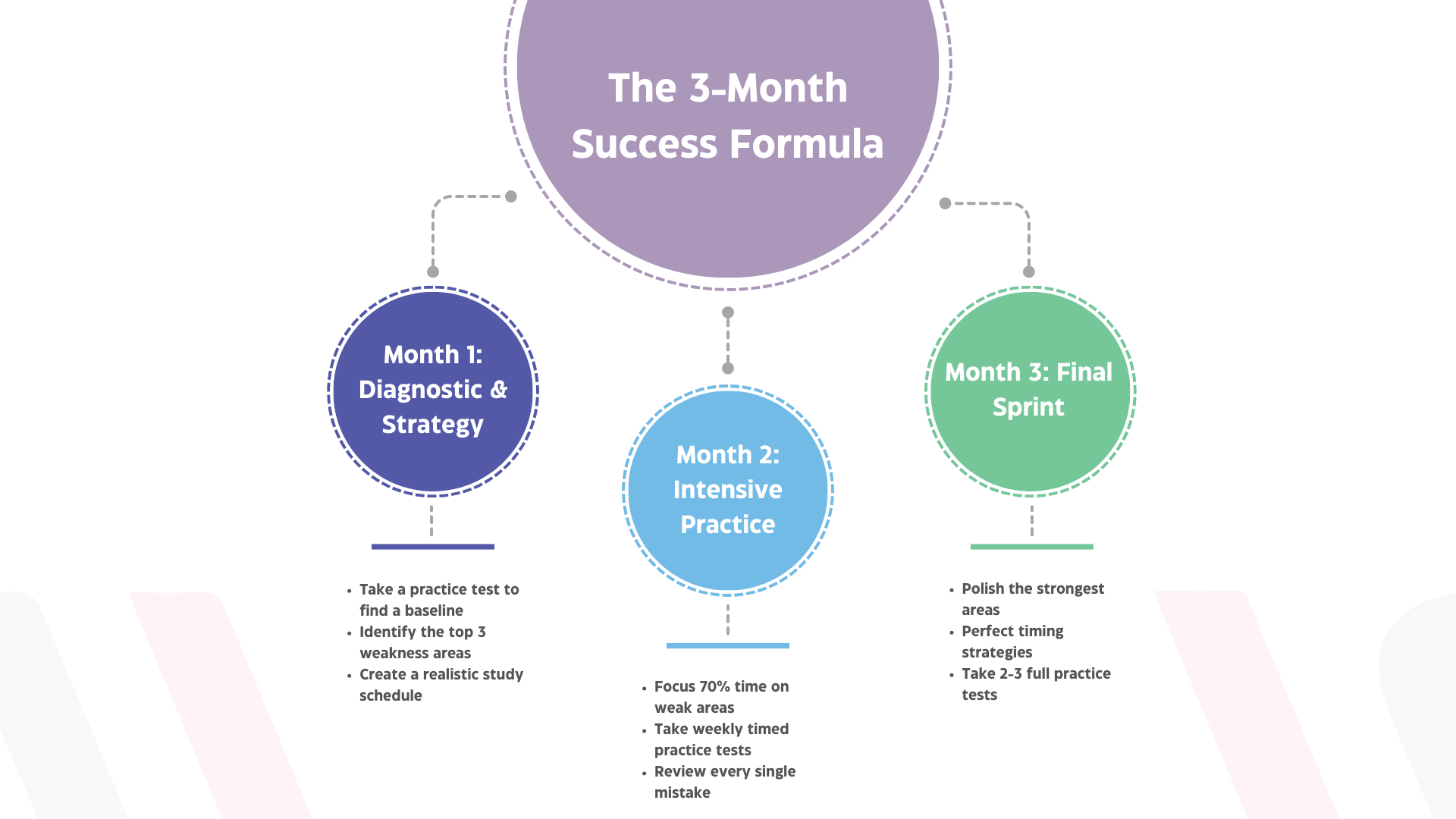 Here’s what top scorers actually use:
Here’s what top scorers actually use:
Study Resources: What’s Worth Your Time?
Free Options
- Khan Academy: Offers personalised SAT practice tests based on your performance. It’s officially partnered with the College Board, so you know it’s legit.
- Official College Board Tests: These are actual SATs from previous years. If you're not practising with these, you're missing out.
- Library Prep Books: Check your local library; many carry up-to-date prep guides from trusted publishers like Princeton Review, Barron’s, and Kaplan.
Paid Options
- Professional Tutoring: If you want 1 on 1 SAT tutoring, prices typically range from $75–$150/hour. It’s an investment, but a good tutor can tailor prep to your exact needs.
- Taking SAT Online Prep Courses: These usually cost $200–$800 and offer structured study schedules, video lessons, and full-length SAT exam practice.
- Group Classes: More affordable than 1 on 1 SAT tutoring, with prices ranging from $400–$1,200. Great if you like learning with others and staying accountable.
Want a complete prep roadmap, from first study session to test day confidence? Read our full blog on preparing for the SAT; it's packed with strategies, timelines, and tips from students who’ve been there and nailed it.
SAT vs. ACT: Which One’s Right for You?
Still stuck between the SAT and ACT? You're not alone. The two tests are more alike than they are different, but your decision can still make a real difference in how confident and successful you feel on test day.
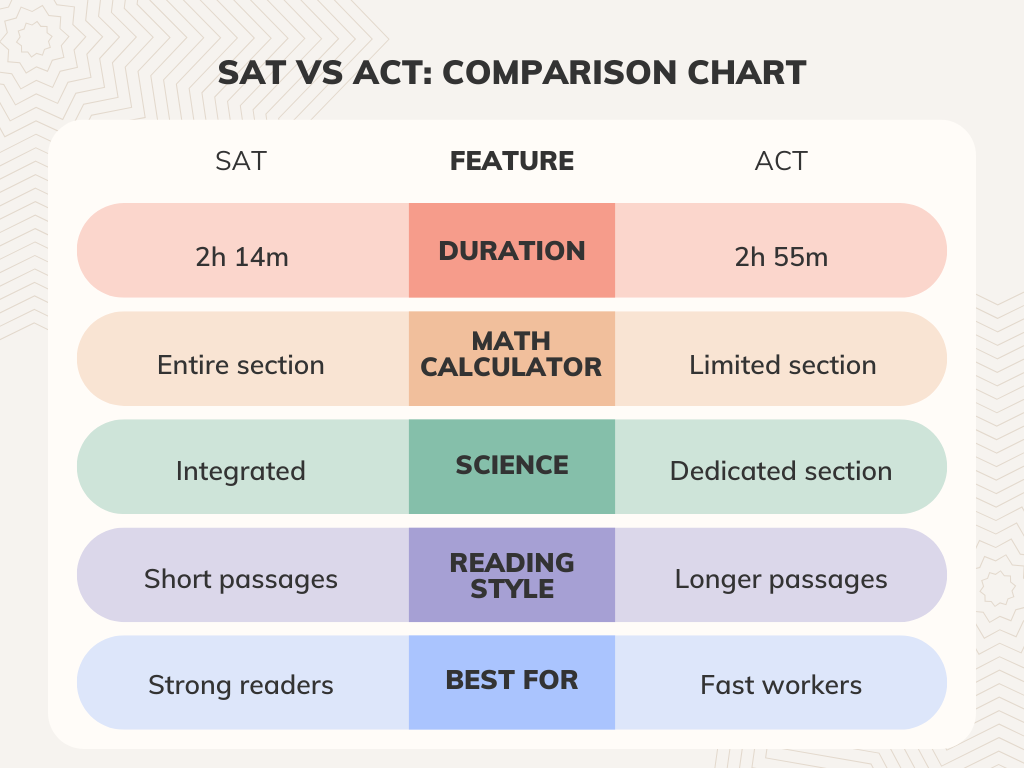 Pro Tip: Go with the test that matches your strengths (math-heavy? Try the SAT. Fast reader? ACT might be your jam).
Pro Tip: Go with the test that matches your strengths (math-heavy? Try the SAT. Fast reader? ACT might be your jam).
Still unsure? Check out our in-depth SAT vs ACT comparison blog for a full breakdown, including pros, cons, and insider tips on how to choose the best test for you.
International Students: What You Need to Know
Here’s what to keep in mind when prepping for the SAT exam or ACT as an international student:
Additional Requirements
- Valid Passport: Required as your test day ID.
- Test Centre Availability: Limited in many countries, so book early.
- Currency Exchange: Registration fees can vary with exchange rates.
- Time Zones Matter: Especially for college app deadlines, plan ahead!
Fun Fact:
International students often score higher in Math than U.S. students, but may face challenges in Reading & Writing due to language barriers. A little extra SAT English reading practice goes a long way!
After the Test: What Happens Next?
So, you’ve taken the test, now what?
Score Release Timeline
- Digital Scores: Available within a few days.
- Score Report: Includes your subscores and percentiles (great for seeing where you stand).
- College Delivery: Your selected schools automatically receive your scores, no extra steps required.
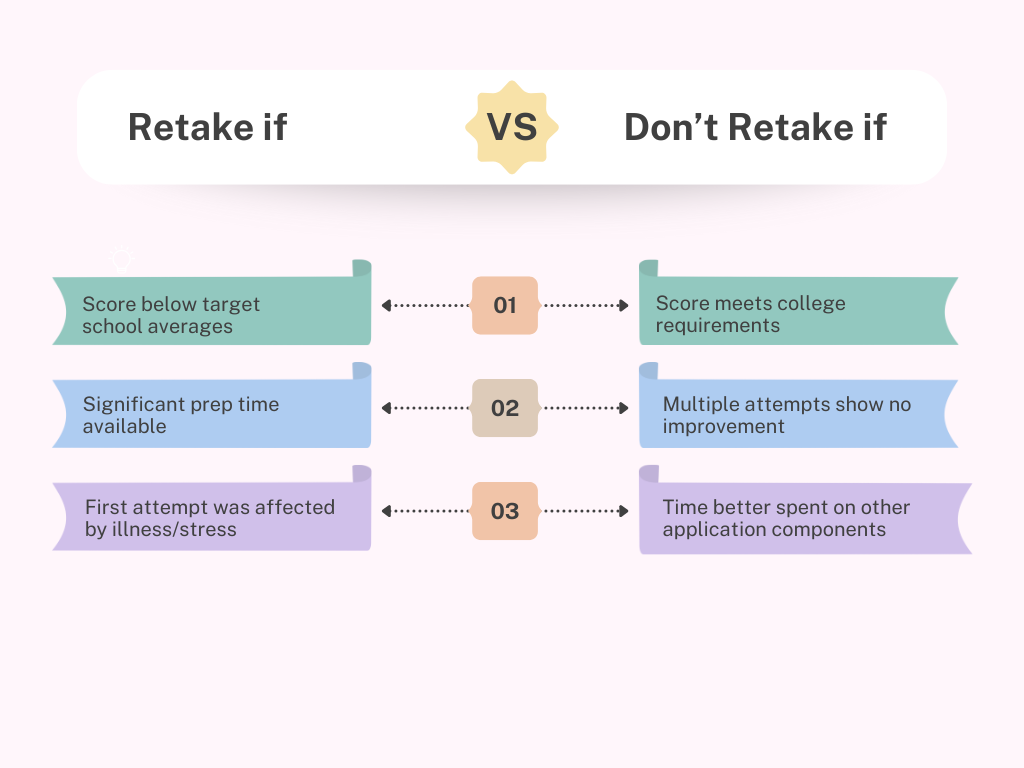
Retakes: What You Need to Know
Thinking about retaking the test? That’s totally normal, and often a smart move.
- Average score improvement: 40 to 70 points
- Best results usually happen by the second or third attempt
- Use your score report to identify weak areas and sharpen your prep
The SAT Is Just the Beginning: Get Ready for What’s Next
The SAT is just one part of your college admissions puzzle, but it’s a key one. With the SAT online format making the test shorter and more student-friendly, now is the perfect time to start preparing. Whether it’s registering on time, understanding the fees, or building a study routine that actually sticks, the earlier you start, the more confident you’ll feel on test day.
But preparing for college isn’t just about the SAT exam. Researching universities, choosing the right courses, planning your housing, and navigating visa requirements all play a major role in your success abroad. The environment you study in, think quiet spaces, reliable internet, and proximity to campus, can directly impact your academic performance and overall experience.
Nearly 2 million students took the SAT exam, taking one step closer to their dream colleges. You can be next. With the right mindset, preparation, and support, getting into a top U.S. university isn’t just a dream; it’s your next chapter waiting to be written.
If you’re looking for expert guidance through every stage of the study abroad process, Uscholars, a trusted study abroad consultant, is here to help. From SAT registration and prep support to personalised application advice and international student housing solutions, you’ll find everything you need to make confident, informed decisions about your future.


